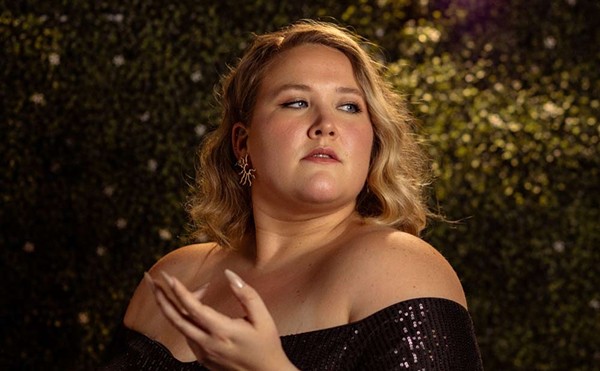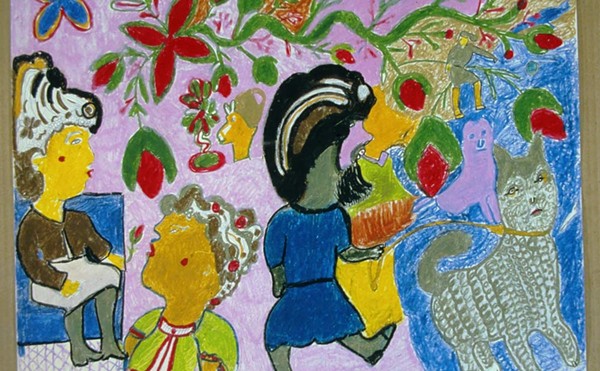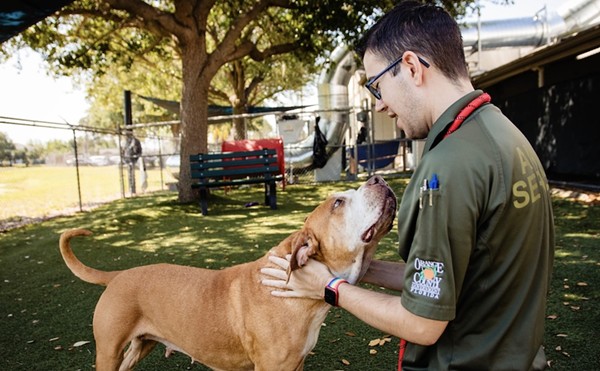The tug-of-war between tradition and progress isn't always an easy one to watch, as those of us who attended last weekend's fifth annual South Asian Film Festival can surely attest. At times, it felt as if this year's program had shot itself in the foot by devoting its running time to challenging, cross-cultural works that alienated the more conservative members of Orlando's Indian community without attracting a commensurate number of liberal converts. But even though I'm nobody's Gandhi, I left Maitland's Enzian Theater on Sunday thinking that the experiment in mutual consciousness-raising had been a success on more than a few karmic levels.
It was somewhat disappointing that the 1999 event's resolutely modern focus didn't bring in a larger crowd of non-Asian viewers. Such features as the existentially riveting "My Son the Fanatic" and the winkingly satiric "Bombay Boys" were among the sharpest, shiniest tools the festival's co-producer, the Asian Cultural Association, had ever employed in its quest to build a cinematic bridge to the land of shared experience. But Saturday's noon screening of the latter film was almost entirely populated by Indian women in flowing satins and their dutifully interested husbands. (Perhaps the balance will be righted at Monday night's encore presentation of the well-received "Boys" -- the first nighttime showing in the festival's history.)
The ethnic mix got better as the four-feature schedule progressed, but ACA members and their invitees still appeared to dominate the proceedings, leading me to wonder if even the most sophisticated Orlando audiences can be cajoled into supporting what they view as "foreign" films.
Terms of Indira-ment
That said, it was refreshing to be the alien in the crowd for once. And I even had a tour guide to help me navigate the uncertain social terrain. Just before "Bombay Boys" began, a wonderfully chatty Indian matron plunked herself down at my table and immediately went about the business of playing a one-woman United Nations in her own endearingly brazen, blunt fashion. Within minutes, I had learned that she: was both a doctor and a princess; had gotten lost on her way to the theater; hailed from Madras, NOT Bombay or Delhi; had seen one film in the last six years ("Scent of a Woman"); and was hypoglycemic, needing orange juice NOW! She even enlisted my aid in refastening a bracelet that was (to put it delicately) too small for her wrist, a task she announced with the half-command "I give you a job." I must have that look of the commoner about me.
As "Bombay Boys" unspooled, she offered a running explanation of the film's sarcastic swipes at its title city's celluloid output. "Typical Indian film," she noted every time the hapless hero found himself on the set of another overheated romantic musical.
At another juncture, a South Asian rock band was seen pulling hits from a huge hash pipe.
"Do you know what they are doing, Stephen?" the Princess Doctor interjected. "That is a hookah!" I did my best to feign ignorance.
Having a cow
Even the lighthearted "Bombay Boys" found disfavor with a few of the ACA's more uptight guests, who were apparently incensed with its portrayal of the capital city as a cesspool of corruption and inferior lodgings.
"When you've been away from home for a while, you tend to remember it as always being the way you left it," ACA program director Jasbir Mehta explained to me.
The controversy deepened when the brilliant "My Son the Fanatic" was shown on Sunday. The film's illustration of the dangers of militant fundamentalism rubbed some attending Muslims the wrong way, and they walked out before the last reel was over. The comparatively open-minded souls who stuck it out remained utterly silent during the end credits, unwilling to dignify the picture with a brief second of applause. Outside the theater, Mehta jokingly wondered if the Enzian would pay for her burial should the need arise.
That reaction seemed to spell doom for "Sixth Happiness," which took as its subject a perpetual dwarf afflicted with brittle-bone disease. In many Asian cultures, physical aberrations are still viewed as punishments for past-life misdeeds -- a veritable mark of the beast -- and I feared that the central character's homosexuality would inspire even more shocked revulsion. My new Indian friend had already shared with me her opinion that the gay lifestyle was just another Western trapping that the young Indians of today were adopting in their desire to appear hip. As if being chased down the street with a baseball bat could ever rival a good microbrew for its trendy luster.
To my relief, no chairs were thrown, though there were some hushed gasps when the diminutive hero was seen kissing a strapping stud on the mouth (a vision that had even startled me a bit when I had previewed the film a few weeks earlier). Maybe this was a more tolerant group than I had adjudged, or perhaps they just didn't see "Sixth Happiness" as a political broadside.
Never say you're sari
The point of a cultural festival, however, isn't for any one group to feel superior, and I've never felt as clueless as I did while watching the historical drama "Man of the Story" draw the festival's warmest reaction on Saturday afternoon. Whatever the risk to my critical reputation, I must admit that I have now seen this film twice and still have no idea what the relationship between any of the characters is, or what is happening to any of them for more than 10 minutes at a time. It's episodic in a way that is all but impenetrable to those brought up on the traditions of Western storytelling, and it traces one man's involvement in India's left-right political swings in such broad strokes that the action often leaps across entire decades without the subtlest warning. Shows what I know: The audience was simply mad about it, guffawing at jokes I couldn't hope to understand and applauding loudly when the lights went up.
In the final analysis, fumbling toward understanding was something that we all did a lot of during the festival, but it was hardly a cause for shame. People don't sprint on their way to tolerance; they crawl, they fall down, and then they get back up and crawl some more. With that acknowledged, every small step forward is a major victory, of which this festival had its share.
For me, one of the finest came during "My Son the Fanatic," when the image of Om Puri's Parvez stared down at a largely hostile crowd and asserted his philosophy that "Friendship is good. I think it can be found in the funniest of places."
As soon as the film was over, my orange-juice-swilling Princess friend sought me out to deliver a wholly unexpected gift: a plastic bracelet that she had once bought from a street vendor back home. With more Parvez in her than she could have realized, she pressed the trinket into my hands.
"You can have it in memory of India," she volunteered. "It doesn't break."

















